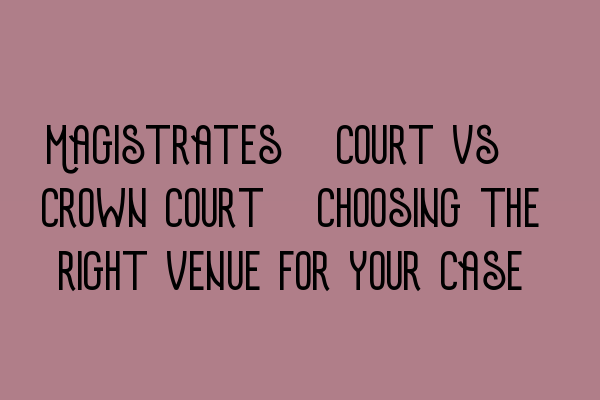Magistrates’ Court vs. Crown Court: Choosing the Right Venue for Your Case
When facing criminal charges in the UK, one of the crucial decisions you need to make is where your case should be heard: in a Magistrates’ Court or a Crown Court. Each venue has its own distinct characteristics, and understanding the differences between them can significantly impact the outcome of your case.
The Magistrates’ Court
The Magistrates’ Court is the lower court in the UK’s criminal justice system. It deals with less serious offenses such as minor assaults, theft, and traffic violations. Most criminal cases actually begin in the Magistrates’ Court. The proceedings in this court are handled by a panel of three magistrates or a district judge.
The Magistrates’ Court offers several advantages. Firstly, it is generally more accessible, with numerous locations across the country. This makes it easier for defendants, witnesses, and legal representatives to attend hearings. Additionally, cases in the Magistrates’ Court tend to be resolved more swiftly, allowing for a speedy resolution.
Moreover, the sentencing powers of the Magistrates’ Court are limited compared to the Crown Court. The court can impose fines up to a certain amount, community service, or short custodial sentences for a maximum of six months. For more serious offenses, the Magistrates’ Court can transfer the case to the Crown Court.
However, if you believe that your case warrants greater scrutiny or you may benefit from a trial by jury, you may wish to consider having your case heard in the Crown Court.
The Crown Court
The Crown Court is the higher court in the UK’s criminal justice system. It deals with both more serious offenses and cases that have been transferred from the Magistrates’ Court. The Crown Court consists of a judge and a jury, ensuring a fair and impartial trial.
If your case is transferred to the Crown Court, it is worth noting that the sentencing powers are significantly greater. The court can impose longer custodial sentences, including life imprisonment for certain offenses. Furthermore, the nature of a trial by jury in the Crown Court allows for a more comprehensive examination of the evidence, potentially leading to a more favorable outcome.
However, it is vital to be aware that the proceedings in Crown Court can be more complex and time-consuming. Cases in the Crown Court often involve more extensive legal representation and may require a more detailed presentation of evidence. This can result in longer waiting times and increased legal costs.
Choosing the Right Venue
When deciding between the Magistrates’ Court and the Crown Court, it is essential to consider the specific circumstances of your case.
If you are facing less serious charges and prefer a quicker resolution, the Magistrates’ Court may be the appropriate venue. Additionally, if the potential penalties align with those available in this court, it could provide a more cost-effective option.
However, if you believe that a more thorough examination of the evidence or a trial by jury is necessary, the Crown Court may be the better choice. This venue offers the opportunity for a more comprehensive defense strategy and potentially greater chances of success.
Ultimately, the decision between the Magistrates’ Court and the Crown Court is a significant one and should be made in consultation with an experienced criminal defense solicitor. They will offer guidance based on the specific details of your case and help you navigate the complexities of the criminal justice system.
In conclusion, understanding the distinctions between the Magistrates’ Court and the Crown Court is essential for anyone facing criminal charges. Evaluating the nature and severity of the charges, as well as considering the potential benefits and drawbacks of each venue, will assist you in making an informed decision. Consultation with a skilled solicitor is crucial in ensuring the best possible course of action for your case.
For more information on Criminal Law and Practice in the UK, explore our related articles:
- SQE 1 Practice Exam Questions
- SQE 1 Practice Mocks FLK1 FLK2
- SQE 2 Preparation Courses
- SQE 1 Preparation Courses
- SRA SQE Exam Dates
